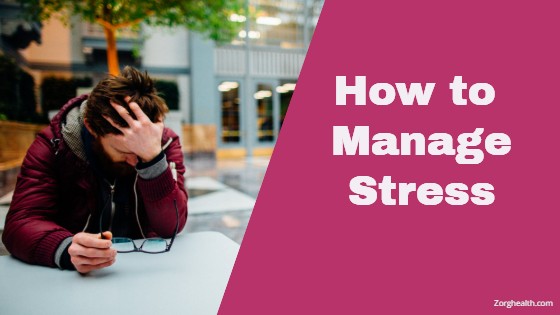Stress and how you should manage it?
Stress! Something that the majority of us deal with at some point in our life. How to manage Stress? imagine you had to submit a deadline but due to reasons you couldn’t, now you feel your body is in a “fight or flight” response which happens due to the release of stress hormones, this feeling may be accompanied by raised heartbeat and rapid breathing.

So, stress is nothing but the only response from your body when you are in unwanted, unfavorable, or unmanageable situations. This response can be mental, emotional, or physical. Studies show that successful people are more stressed out and on the other hand some people often use stress as a positive measure to bring changes which leads them to achieve their targets.
We live in a world full of situations that are out of our control, responsibility from the workplace, family situations, illnesses, and some unfortunate events like the demise of someone close or accidents, all can lead to stress. In some situations, an immediate response may be beneficial to you and may help in showing prompt action to the situation by making you more aware and clearer about the situation, while long-term stress can affect your health.
The physiology behind stress!
Our body prefers to be in a steady-state known as eustatic which has been achieved through evolution. The world we live in constantly challenges this equilibrium through various stressors. Stress is a response that demands two-way interaction between the brain and other systems of the body like the cardiovascular, respiratory, and immune systems. During some stressful situations, our autonomic nervous system activates, and via hypothalamus-pituitary-adrenal (HPA) axis response stress hormones are released.
Our brain categorizes life experiences as threatening or non-threatening and decides whether to release stress hormones or not. When released, these stress hormones act upon certain areas of the brain, which also play a role in memory, anxiety, and thought processes. In acute stress or short-term response, these hormones lead to “allostasis” meaning maintaining the body’s equilibrium or homeostasis. But during the long-term or chronic stress, these hormones lead to ‘allostatic load’ which means accumulating wear and tear of the body which affects overall well-being.
How does stress affect our bodies?
Effect on the central nervous system-
when the stress hormones are released, they act to increase heartbeat and blood flow to areas that are in immediate need of increased blood supply like muscles. Once the stressor is gone things go back to normal and the hypothalamus sends signals to stop releasing stress hormones. But if the central nervous system doesn’t return to the initial state or if there is chronic stress the fight or flight response will continue which will increase the speed of aging and will make it prone to various illnesses.
Cardiovascular and respiratory systems-
when stress hormones are released, the heart beats faster, and also the blood vessels experience more contraction so that more oxygen is diverted to the muscles for more strength which not only increases blood pressure but also requires faster breathing for rapid exchange of oxygen and carbon dioxide in lungs, which may become a problem in asthmatic people. As a result, stress makes your heart work harder, and when it happens for a long time, you might develop a risk for stroke or heart attack.
Gastrointestinal tract-
Stress can affect our gut for both the short and long term. During stress as the blood supply increases for muscles and the brain, our gut system receives less blood, which leads to reduced oxygen to the stomach, which is the reason for cramping, nausea, acid reflux, bloating, diarrhea, or constipation. Chronic stress may lead to the development of a few gut disorders like irritable bowel syndrome and also may worsen it. Recently there is a surge of research articles on the “brain-gut axis”.
Under stress liver is also signaled to produce extra sugar (glucose) for more energy, this rush of extra sugars for a longer duration may increase your risk of developing diabetes mellitus (type 2 diabetes).
Muscles-
Stress makes our muscles suddenly tense up as an instinct to protect ourselves against injury. When this stressor is gone muscles go back to their previous nature but in chronic stress where stress hormones are released for longer duration muscles may react in extreme ways like going in spasm or you may even experience chronic shoulder or neck pain or migraines. Even further this can lead to musculoskeletal problems like muscle atrophy and a decrease in lean muscle mass. Other things which you can experience are jaw pain or even dizziness from chronic tension in neck muscles.
Reproductive System-
The release of stress hormones and glucocorticoids (cortisol) inhibits gonadal steroids or sex hormones. This leads to reduced sperm count and interferes with ovulation. Chronic stress not only increases the risk of infection of male reproductive organs, prostate, and testes but also can cause impotence.
In females, stress interferes with the normal menstrual cycle and can make menopause come early or be more problematic.
The Immune System-
During a fight or flight response stimulation of the immune system can be beneficial for immediate response. But when released for a longer duration the stress hormones suppress the efficacy of the immune system by reducing the production of lymphocytes. Also, few people adopt unhealthy habits like alcohol drinking and smoking which affect the immune system.
Symptoms of Stress
Acute stress may not be of worry but being aware of signs and symptoms of chronic stress will allow you to diagnose it earlier and take care of it. As we already explained stress affects our body at three levels, physical, mental, and emotional, let us understand different symptoms at different levels.
Here are the physical warnings signs of chronic stress-
- Unexplained headaches, muscle tension, or muscle pain.
- Too little or too much sleep.
- Gut problems, flaring up of IBS, sudden sensitivity to certain foods.
- Menstrual irregularity.
- Feeling tired all day.
- Losing concentration.
- Fluctuations in body weight.
- Frequent infections, flaring up of allergies, asthma, or arthritis.
Here are the mental and emotional symptoms of stress-
- Low mood/ feeling depressed
- Getting irritated easily.
- Poor motivation
- Frequent anxieties or restlessness or even panic attacks
- Feeling hopeless
- Social withdrawal
When under chronic stress people may adopt or develop some of the bad or unhealthy behaviors like- drinking alcohol, smoking, drugs.
After getting to know that someone is suffering from stress it is even more important to know what caused it. Some of the catastrophic events or accidents (death of someone close, going through divorce or breakup, incurable illness) are obvious reasons for stress, but there are few day-to-day things which we think are a normal part of life but in fact, can have a significant negative impact. Here are a few causes of stress that you might not even notice-
- Working too late or under pressure or heavy workload
- Being criticized or harassed at work
- Poor performance in school or college
- Family, relationship, or marriage problems
- Running always busy
- Job loss or not liking your job
- Financial loss
Let us also know some of the stress of the disease can give us-
- Anxiety/depression
- Hypertension
- Irregular heartbeat/cardiac arrhythmia
- Coronary artery disease, atherosclerosis (stiffening of arteries)
- Myocardial infarction or heart attack
- Gastrointestinal diseases, irritable bowel syndrome, stomach ulcer
- Infertility or impotence
Here is how to manage Stress
The stress response is subjective. What might not be a problem to your friend or close one can be a major stressor for you, for example, take the COVID-19 pandemic few people who lost their close ones or lost their job must have experienced stress. Even the fear and uncertainty of covid-19 can have disastrous effects on mental health. So how one responds to stress depends on-
- Uncertainty of an event especially when you have no control over it, e.g. covid -19, job placement.
- Fear after news about what’s happening around us like terror attacks, global warming, increasing pollution.
- Individual perception and attitude towards a problem.
- How one handles major life changes like moving to a new place or joining a new workplace.
- Last is to know when you have unrealistic expectations.
- All these factors can decide how based on individual personality one responds to stress, some cope up nicely and keep going while others just may feel impossible to do anything.
Here is what you should do-
- Identify your stressor
- Be realistic on achieving goals don’t be harsh on yourself
- Develop a hobby or spend good time with your friends, discuss your problems and get a new perspective on solving them
- Say no to bad habits, stay away from drinking and smoking
- Focus on some quality “me” time spent doing something you love, listening to calming music, and reading books you love.
- Practice sleep hygiene, don’t stay awake at night, make bedtime regular.
- Make yoga, meditation, or exercise your routine,
- See inspirational videos, encourage yourself to keep going
- Learn to say “no”, don’t take responsibilities you can’t fulfill.
If you feel panic attacks or feel like you are not at all able to handle stress, it’s good to take expert advice. You can refer to mental health experts, psychiatrists, or psychologists for a proper diagnosis and treatment or therapy.
Here are some foods and beverages you can include in your meal plan to fight stress even better-
- Green tea- matcha is a very popular green tea, rich in L-theanine, and has a significant stress-relieving effect.
- Chamomile tea- an ancient natural stress reliever, also known to improve sleep quality and fight depression.
- Garlic-although human research is still awaited to prove its effects, it is believed that high sulfur in garlic and its antioxidant properties can reduce stress.
- Broccoli- a cruciferous vegetable rich in magnesium, vitamin C, folate, vitamin B6 not only protects against cancers and heart diseases but also helps to fight against various mental illnesses.
- Sunflower seeds- low intake of vitamin E is known to cause altered mood and anxiety and sunflower seeds are rich in vitamin E.
- Chickpeas- a plant protein that is delicious and popular and also let you experience you better mood as it is packed with anti-stress vitamins and minerals.
- Eggs known to be a powerful source of protein are a powerful mood booster, rich in choline known to protect the brain against stress.
- Sweet potatoes-a rich source of carbs that helps in lowering stress hormone cortisol and better regulation of cortisol in chronic stress.
